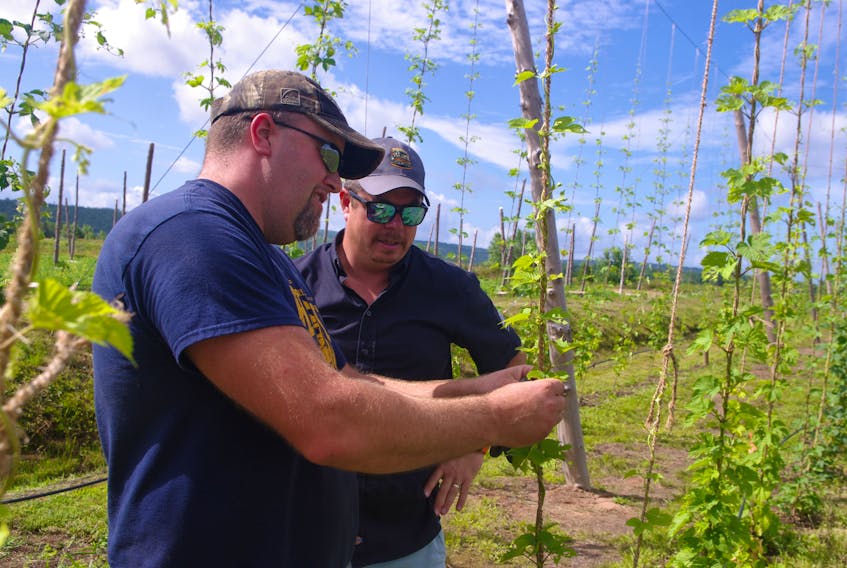TUPPERVILLE, NS - If Joel Riley has anything to do with it, Nova Scotia craft beer is going to have great flavour.
Riley manages Hamiltons Hop Yard in Tupperville, a riverside farm that promises a dozen varieties of hops - a key beer ingredient going back more than a thousand years.
It's Roland Hamilton's hop yard and it's nestled in a bend of the Annapolis River in what used to be a dozen or so old cranberry bogs. So far, an acre of those old bogs has been redeveloped, with potential for 20 acres of hops altogether.
"A lot of what we have here has pretty much been in the ground for a year," said Riley of that one acre.
Vines crawl up coconut fibre twine 18 or 20 feet into the air, supported by an intricate trellis system of poles and cables. There are 1,080 plants and 12 varieties. When the rhizomes are mature in another four years, the rows of plants will be like solid walls. In the meantime, there will be harvests of increasing size each year.
The plant is a herbaceous perennial. The cones are dried and pelletized, and when added to beer in the brewing process, it adds bitter, zesty, or citric characteristics to the brew.
"The brewers can't just use one so they're looking for different varieties to increase their recipe," said Riley.

Impressed
Danny McClair and Paul St. Laurent of nearby Annapolis Brewing Company toured Hamiltons Hop Yard July 23 and were impressed.
"Coming out here is kind of eye-opening. I didn't expect it to be this size and this far along," said McClair as he stood among the vines that climbed a dozen feet above his head. The flowers had already produced tiny cones that, with almost two months left to mature before harvesting, will be a few inches long each.
"It's an impressive thing to see in our backyard, this kind of stuff happening. People out here working. Five employees here working, full time."
McClair said Hamiltons Hops Yard is great for the local craft beer market.
"Varieties, I think, are bang on," he said. "I think they did some research and talked to the right people. I'm happy with the selection that should come out of here, and hopefully, the quality will be as good as it looks now."
When the cones are harvested they will be dried, pelletized, and packaged on-site.
Hops have alpha and beta acids that dictate the bittering of the beer and the aroma. The Alpha acids bitter the beer and the beta acids are more for aroma.

Hops market
With 50-plus craft beer makers in Nova Scotia, Riley hopes to supply hops to a lot of them.
A mature field should produce about 2,500 pounds of hops. At that rate of yield, four acres could supply Nova Scotia brewers, he says. Ten acres could supply all of the Maritimes.
Hops staples are varieties like Cascade, Centennial, and Willamette.
"Hops like that I think everybody's using and will be using for a long time," Riley said.
But craft beer brewers are prone to experimenting and Riley has other varieties that give them range to try new recipes. He wants to supply the hops that are going to work for brewers, especially the local guys.
The labour intensity McClair noticed during the tour is a real thing.
"With the hops themselves, they're very labour intensive. It takes a long time - pruning early in the season. You've got to maintain the weeding. Making sure there's water is the big thing.”
It's a full-time job for two people to maintain one acre.
"With the expansion, we're looking at doing - digging, putting poles in, ground prep, trellis systems - all that takes away from dealing with the actual plant itself, so that's where we'll be looking for more help down the road."
Hamilton's Hop Yard already has a second acre planted and is looking at doing another two-acre lot in the next year and a half.

Great Experience
St. Laurent said the experience at the hop yard was great.
"As brewers, we can now appreciate when we're dumping hops into our brews where they came from," he said. "And when you're paying the prices you are for hops, now it all makes sense. It's not just a plant pelletized ending up in a bag and then shipped to a brewery. There's a lot of work that goes into the end product."
He said Hamilton's is growing the right varieties for a lot of the Nova Scotia breweries.
"They will sell every hop pellet that comes out of this farm, guaranteed," he said.
Did Riley ever think this is what he'd be doing?
"Not in a hundred years, but I'm some glad I did," he said. "Working up here at Hamiltons Hop Yard - I like being outside, I'm not scared of some hard work, there's good people up here. When you're doing stuff that leads to beer every day, it's rarely a bad day."
READ MORE:
- Source your Annapolis Valley craft beer
- Crafting a new future for beer in the Annapolis Valley
- ‘It’s a labour of love’: Pioneering brewer reflects on success at Sea Level in Port Williams
- Head of the class: Ellershouse man passionate about creating the beer behind Schoolhouse Brewery
- ‘From grain to glass’: Horton Ridge Malt and Grain Company adding local flavour to the craft beer business
- From farm to bottle: Sourcing local hops a challenge for Annapolis Valley brewers
- ‘A disadvantage in our own market’: Craft beer brewer association president says Nova Scotia brewers hit with unfair tax
- ‘The more the merrier’: Annapolis Valley brewers say craft beer appeals to those from 19 to 90 in Nova Scotia
- ‘A better beer-drinking experience’: Why these three women love Annapolis Valley craft beer
- ‘Be a little adventurous’: Man behind Lawrencetown brewery gave up career out west to follow his dreams
- From pinching pennies to tossing the PhD: Paddy’s brewmaster Kirsten MacDonald talks about her love for craft beer
- Not just taste: Unique label art, logos a big part of the craft beer industry
- Brewing it up: Four ingredients, limitless kinds of beers
- High hopes for hops: Hamiltons Hop Yard growing the flavours that make craft beers interesting









